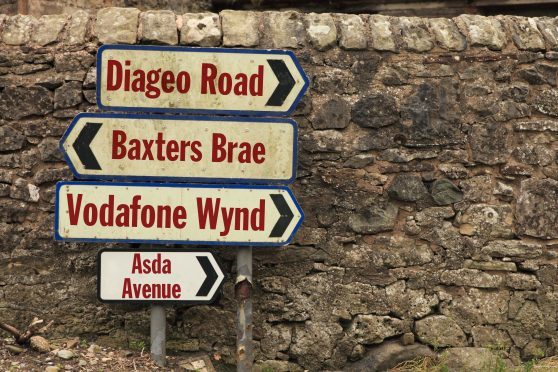Moray Council has resorted to selling off street names to businesses in an attempt to raise much-needed funds.
Firms will be able to buy the name of roads and landmarks that make up new housing developments as part of a £20,000 “sponsorship” deal.
The pioneering initiative, which is believed to be the first of its kind in Scotland, opens up the possibility of Asda Avenue, Tesco Terrace and Glenfiddich Grove appearing in towns and villages across the region.
But yesterday local representatives rejected the suggestion that it would “cheapen” communities.
The local authority was forced to plunder its resources to plug a £12million budget black hole earlier this year, with further cuts looming in an attempt to stave off forecasted bankruptcy.
Fochabers Lhanbryde councillor David Bremner praised the ingenuity of the scheme to generate cash but was concerned the system could attract controversy.
He said: “I think it’s a good idea. It’s an example of somebody in the council thinking outside of the box.
“It’s important that elected members retain the final say though before anything changes.
“I’m pretty sure people would be angry if a company came along with environmental, tax-paying or human rights credentials that are less than perfect.
“Roundabouts already have sponsorship signs up. This wouldn’t be that much different.”
Mr Bremner was also eager to see the possibility of money raised through the scheme being ring-fenced to support communities in that area.
The payments were included in Moray Council’s new street naming and numbering rules that were agreed at yesterday’s planning committee meeting.
The offer will be made open to local companies and will only be available on new roads to avoid the confusion of changing addresses.
The authority’s head of development services, Jim Grant, explained the “unusual” policy was believed to be the first of its kind.
He said: “It’s really come about due to the council’s financial constraints and officers looking at the opportunities for additional income.
“We think there’s probably limited use for this but we do believe there would be a few opportunities where a commercial company may wish to ‘sponsor’ the name of a street or a bridge that provides some commercial benefit.
“I’m particularly thinking of distilleries and things like that – long-standing industries that may wish locations close to them being named after them.
“I think it’s unlikely to come about very often but I think it’s worth having in the policy to allow us to do that.”
Mr Grant added that sponsored roads would still have to comply with the “general principals” of street names, which include preserving historical names from the area, commemorating local
events or culture and honouring noteworthy people.
Proposed names will have to be approved by local councillors before being introduced.
With more than 4,000 homes currently proposed for Elgin over the next 20 years the town is likely to present firms the biggest opportunity to buy a street.
Last night the town’s community council chairman, Alistair Kennedy, was eager to avoid blatant advertising such as “Buy one get one free Street”.
However, he said it was important the council pursued new avenues to generate income.
“I don’t think it would really cheapen communities,” he said. “Streets have to be named anyway so why shouldn’t the council be able to make some money off it? Just as long as we don’t see
anything stupid.
“I think distilleries and things like that could work. At £20,000 though it’s a lot of money. I don’t know how successful it will be at that price.”
